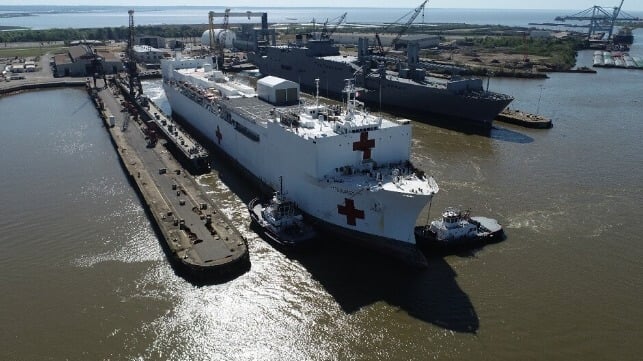Private Equity Fund Buys Alabama Shipyard for Austal USA's Sub Program

The U.S. Navy has helped finance a major shipyard acquisition agreement on the Gulf Coast, expanding its submarine construction capacity by brokering a de-facto merger of two private shipyard facilities in Mobile, Alabama.
Working with private equity firm CapZone, submarine builder General Dynamics Electric Boat, Navy-focused shipyard Austal USA and ship-repair contractor Alabama Shipyard, the Navy has sponsored an agreement to expand Austal's submarine module construction business onto the 355-acre site of Alabama Shipyard, which is adjacent to Austal's existing facility in Mobile.
The deal has several layers. Prime contractor General Dynamics Electric Boat awarded Austal a $450 million contract to expand submarine module production capacity; the Navy provided a $152 million contract directly to Austal as part of the National Sea-Based Deterrent fund; Austal invested in a CapZone-administered federal opportunity zone fund (the USA Fund), alongside other private investors; and the Fund purchased Alabama Shipyard's facility and related assets, with plans to develop 75 percent of the site to support submarine production and workforce training. The site will be renamed the Mobile Naval Yard, and the CapZone fund will hold ownership and responsibility for development and management.
The agreement includes "contractual mechanisms that support Navy oversight and authorities to safeguard Navy and national security interests," the Navy said. The service has previously addressed concerns about past contract accounting issues at Austal.
"This Navy initiative is a model for how public-private partnerships can address critical infrastructure needs in the defense and national security sectors," said CapZone CEO Al Puchala. "We developed this platform to activate institutional and private American capital to support government priorities. Our model not only drives financial investments to support the Navy's operational requirements, which are under extreme pressure to meet global threats, but also to spur economic growth and job creation in the region."
The sub indusrial base initiative is one of the Navy's top priorities, and the service is putting billions of dollars into workforce recruitment, financial support and shipyard expansion. To meet the combined needs of the Columbia-class and Virginia-class programs, the Navy says that submarine production has to double, requiring an extra 3.5 to 4.5 million man-hours of submarine module production and outfitting every year.
